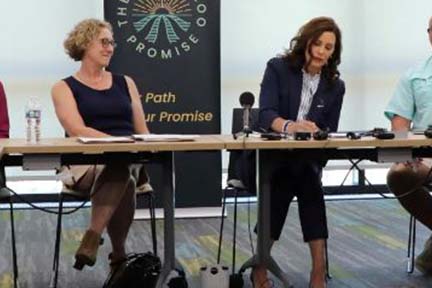
Nationwide Anti-Robocall Litigation Task Force
|
|
|
|
|

|
|
|
|
|


FOR IMMEDIATE RELEASE July 27, 2022 Contact: [email protected]
Gov. Whitmer Statement on Senate Passage of CHIPS+ Act Bipartisan legislation will face the chip crisis head-on, lower costs, shore up national security, boost domestic manufacturing, create and protect tens of thousands of good-paying jobs
LANSING, Mich. – Governor Gretchen Whitmer issued the following statement after the United States Senate passed legislation including the Creating Helpful Incentives for the Production of Semiconductors for America (CHIPS) Act.
“The Senate’s bipartisan passage of the CHIPS Act is a win for Michigan’s workers, manufacturers, and consumers.
“This game-changing bill will make once-in-a-generation investments to set up the United States for decades of economic growth by bringing this vital supply chain home, creating and protecting tens of thousands of good-paying jobs, and lowering costs for families.
“I am grateful to Senator Stabenow and Senator Peters for leading on this issue in the Senate and working across the aisle to get it done. When it is signed into law, the CHIPS+ Act will shore up our supply chain and support companies based in Michigan including our auto industry, homegrown chip manufacturer Hemlock Semiconductor, and other high-tech firms including SK Siltron and KLA.
“In the days ahead, I am confident that thanks to the strong support of our Michigan delegation, the House of Representatives will pass this bill, and I urge them to send it to the president’s desk as quickly as possible so we can get the incentives laid out in the legislation out the door, build on Michigan’s economic momentum, and ultimately lower costs for Michiganders. I am proud that we are showing the world that the United States is the place to build the future. Let’s keep moving Michigan forward.”
CHIPS+ Act Opportunity The CHIPS+ Act would fund $52 billion in incentives to boost domestic semiconductor production and research, $2 billion of which would be dedicated to incentivizing production of the “mature node” semiconductors used by automakers and parts suppliers. Mature node chips are also used in medical devices, agricultural machinery like farm tractors and combines, as well as radiation-proof chips required by our national defense industrial base.
The CHIPS+ Act would provide a new, powerful tool in Michigan’s economic development toolbox. Increasing domestic chip production near automakers and other manufacturers will spur innovation, reduce inefficiencies, and avoid costly delays, helping Michigan attract long-term, sustainable investments from companies around the world.
Late last year, the Michigan Legislature, businesses, labor, and utilities worked with Governor Whitmer to pass bipartisan economic development legislation that helped Michigan land a $7 billion investment from GM creating and retaining 5,000 good-paying jobs, and earlier this year, Ford invested $2 billion creating 3,200 jobs. Signing the CHIPS+ Act into law will pave the way for more transformational projects that will invest billions into our communities and create tens of thousands of good-paying jobs.
Chip Crisis Impact Semiconductor chips are a vital component of many products used by people every day. The global shortage of these chips, exacerbated by the pandemic and supply chain constraints, has impacted people and industries across the country from auto manufacturing to consumer electronics, home appliances, medical devices, agriculture, defense and more. These shortages have resulted in reduced production and in some cases, idled plants, impacting more than 575,000 auto-related American jobs. In 2021, automakers in North America lost an estimated 2.2 million vehicles, equaling over 3,000 days of work.
This means workers with less income, higher prices at the store, less products for consumers to buy and an ever-growing dependence on foreign supplies. In the long run, increasing domestic production of chips will protect and create jobs, strengthen our supply chain, and grow the economy. Fully funding the CHIPS+ Act will bring chip manufacturing back home, creating and protecting thousands of good-paying jobs, growing America’s economy, and lowering costs for families. |


FOR IMMEDIATE RELEASE July 27, 2022 Contact: [email protected]
Governor Whitmer Announces $321 Million Investment in 1,650 Michigan Communities Supporting Infrastructure, Economic Growth Federal funding from American Rescue Plan will help local governments deliver essential services
LANSING, Mich. – Today, Governor Gretchen Whitmer announced more than 1,650 communities in Michigan will receive more than $321 million to help them invest in infrastructure, grow their economies, and continue delivering essential services as part of the second batch of federal American Rescue Plan Act (ARPA) Coronavirus Local Fiscal Recovery Fund payments.
“This funding will empower over 1,650 communities across Michigan continue getting things done that make a real difference in people’s lives,” said Governor Whitmer. “As we focus on growing our economy and creating good-paying jobs, today’s over $321 million in funding will help counties, cities, villages, and townships across the state invest in local roads and bridges, support essential workers, and protect safe drinking water. Local officials have a once-in-a-lifetime opportunity to make lasting investments in the kitchen-table issues that matter most. Let’s keep working together to get things done.”
The funding provided to counties, cities, villages and townships across the state can be used to respond to the effects of the COVID-19 pandemic, bring back jobs, provide premium pay to essential workers, make up for lost revenue or invest in water, sewer or high-speed internet infrastructure. Recipient local units of government have until 2024 to identify projects and obligate funds.
Previously, the first half of Coronavirus Local Fiscal Recovery Fund payments totaling more than $321 million was distributed to smaller communities within the last year. In total, ARPA provided more than $642 million in Coronavirus State and Local Fiscal Recovery Funds to Michigan’s smaller communities.
The U.S. Department of Treasury is responsible for directly distributing $1.80 billion to 49 Michigan metropolitan cities and townships and $1.93 billion to all 83 Michigan counties. The state of Michigan is responsible for distributing Coronavirus State and Local Fiscal Recovery Funds dollars to smaller cities, villages and townships.
The Michigan Department of Treasury worked with local government partners and local communities to provide technical assistance and education through webinars, phone calls and certified letters to ensure local officials would not miss the opportunity to claim their allotted federal funds.
“My team is ready to continue to assist local communities receiving this important aid,” said State Treasurer Rachael Eubanks. “Local officials are encouraged to reach out to our team if they encounter issues receiving a payment.”
The U.S. Department of Treasury is responsible for providing rules on how local units of government can spend their ARPA dollars.
Details about the first and second batch of state Treasury Department disbursements to smaller communities are available. To learn more about the program, go to Michigan.gov/ARPA.
Quotes from communities: “The village of Calumet has received $72,195.96 in American Rescue Act Plan funds,” said Amber Goodman, Calumet Village Manager. “These funds are vital to strengthen the community and will be offsetting costs associated with employee salaries. The America Rescue Act Plan funds have provided a needed boost to the community.”
“The city of Gaylord is utilizing its ARPA funds for a utility upgrade project,” said Kim Awrey, Gaylord City Manager. “Over the last few years, we have seen significant development on the East side of town. The Pines45 apartment complex is nearing completion and construction has started on a Luxury RV Park in the same area. The sanitary sewer line servicing this area is undersized and requiring an upgrade prior to the RV Park being able to open. Under normal circumstances, the city would have had to choose between this project and the proposed project laid out in our Capital Improvement Plan. The receipt of ARPA funds allowed the city to move forward with both projects this summer.”
“The infusion of ARPA funds will allow the city of DeWitt to extend sanitary sewer to several homes in DeWitt currently served by aging septic systems,” said Dan Coss, DeWitt City Manager. “The expansion of this critical infrastructure will aid in the protection of one of the most valuable assets in Clinton County and city of DeWitt, the Looking Glass River. In addition, a portion of the ARPA funds will allow DeWitt to increase our 2023 paving projects to include additional streets that would have otherwise been delayed to future years.”
“The village of Dansville is very thankful for the ARPA funds,” said Mike Stolz, Dansville Village President. “It will allow us to upgrade some of our technology and systems that we use and also help us with our infrastructure needs.”
“The benefit of ARPA funds in Buchanan Charter Township will be recognized in broadband expansion to our unserved and underserved areas,” said Malinda Cole-Crocker, Buchanan Charter Township Supervisor. “The economic boost to the community through broadband will be priceless.”
“While Allendale Charter Township is still in the process of narrowing down our list of uses, we see several needs in the community that can be addressed with our ARPA funds,” said Adam Elenbaas, Allendale Charter Township Supervisor.
“The ARPA funds have been used to provide a professional fire assessment study that, once acted on, will greatly improve fire suppression services in Harper Woods,” said John Szymanski, Harper Woods Finance Director. “Additionally, we are using the funds to make one time building improvements on behalf of our first responders and redesigning service delivery models to include 24-hour duty shifts for police officers that will effectively double the amount of visible patrols in the city.”
“The village received a little over $186,000 for our ARPA funds,” said Sue Kohn, Standish Village Treasurer. “We are engaged in a new water and sewer project in the White’s Beach area in Standish Township, Arenac County. We will have some extra costs for a Water Tower and a Lagoon, so those extra funds will take some burden off of the citizens in that area.”
“Bangor Charter Township has approved to spend $1.03 million of its ARPA funds to replace drinking water lines, including replacing cast-iron lines and the current four-inch lines with eight-inch lines,” said Glenn Rowley, Bangor Charter Township Supervisor. “This will ensure safe drinking water for our residents, and the replacement of undersized piping will guarantee proper pressure in the lines to the hydrants for fire suppression. The township board has also approved the purchase of two moist heat decontamination units, totaling $15,900, for our fire department.”
|


FOR IMMEDIATE RELEASE July 26, 2022 Contact: [email protected]
Gov. Whitmer Signs Executive Directive to Reduce Crime, Gun Violence Governor directs state government departments and law enforcement agencies to coordinate and invest all available federal resources into crime and gun violence intervention and prevention
KALAMAZOO, Mich. — Today, Governor Gretchen Whitmer signed an executive directive instructing Michigan state departments and law enforcement agencies to utilize federal resources from the recently passed Bipartisan Safer Communities Act to reduce crime and gun violence. This action follows a roundtable discussion the governor held with members of the law enforcement community, parents, students, and faith leaders on how to stop violence and hold criminals accountable for committing violent crimes.
“As a former prosecutor, public safety is a top priority for me,” said Governor Whitmer. “But today, far too many families in Michigan do not feel safe in their neighborhoods because of crime and gun violence. That is unacceptable—we must stop the violence and hold people accountable. We need to tackle both crime and gun violence simultaneously because they are inextricably linked—nearly 1 in 3 reported violent crimes involve a firearm and in the first six months of this year alone, over 450 Michiganders have died because of gun violence. That’s why I worked to give law enforcement the resources they need in my bipartisan budget. And thanks to the Bipartisan Safer Communities Act, we have access to unprecedented federal resources that will help us keep Michiganders safe as they go to work, drop their kids off at school, or run errands in their neighborhoods. Let’s work together to protect public safety and reduce crime and gun violence.”
The executive directive can be viewed here.
“The gun violence epidemic has been tearing apart thousands of Michiganders’ lives each year with nearly no government action taken to prevent such tragedies. Today, however, this changes,” said Zoey Rector-Brooks and Jayanti Gupta, youth leaders of March For Our Lives Michigan. “The executive directive signed by Governor Gretchen Whitmer will strengthen Michigan’s ability to stop gun violence before it happens by providing Community Violence Intervention, a program proven to be an effective approach to disrupting violence in our communities. It will also work to further close the “boyfriend loophole,” which has for too long put those in domestic relationships at risk. There is much work left to be done, yet this is a victory worth celebrating. Lives are being saved.”
Executive Directive Background Governor Whitmer’s executive directive instructs Michigan state departments and agencies to effectively utilize all available resources from the recently passed Bipartisan Safer Communities Act to reduce crime and gun violence. Within 30 days, all departments and agencies must identify a designee to coordinate across state government. The Michigan State Police (MSP) must explore ways to improve Michigan’s process for reporting criminal, mental health, and juvenile records to national criminal databases. MSP must also establish the Community Violence Intervention Office which will coordinate state and federal grants related to community violence intervention programming.
Governor Whitmer’s Public Safety Investments As a former prosecutor, public safety is a core issue for Governor Whitmer. She has worked closely with local leaders, law enforcement officers, and community organizations to ensure people feel safe in their neighborhoods. Since taking office, she has signed four balanced, bipartisan budgets, each making record investments to help communities fund local law enforcement departments and hire more first responders. These budgets have expanded training and resources available to law enforcement from the MSP to local departments in every region of the state.
Last summer, the governor proposed MI Safe Communities, a plan to invest $75 million in federal funding from the American Rescue Plan to reduce crime and keep families safe by getting illegal firearms of the street, tackle the criminal court backlog, expand resources available to law enforcement, and address the root causes of crime by investing in jobs programs, counseling, and education.
Governor Whitmer’s Criminal Justice Investments Governor Whitmer has also worked across the aisle to enact historic criminal justice reform. She signed bipartisan “Clean Slate” legislation to help hundreds of thousands of Michiganders emerge from the criminal justice system with enhanced opportunities for jobs and housing, empowering them to pursue their full potential. She also launched task forces to address pretrial incarceration and juvenile justice and pursued reforms to improve relationships between law enforcement and the people they serve.
Last week, Governor Whitmer signed her fourth balanced, bipartisan budget that included funding for Jobs Court, a program that offers non-violent, low-level offenders gainful employment with local partnering small businesses.
|

FOR IMMEDIATE RELEASE
July 22, 2022
Contact: [email protected]
ICYMI: Detroit Free Press: Michigan is Desperately Trying to Make Private Child Care More Affordable
LANSING, Mich. – After launching a plan to address the childcare shortage, Governor Whitmer has worked with lawmakers on both sides of the aisle to expand access to high-quality and affordable child care, while delivering record funding to keep childcare programs open, and retain and hire childcare professionals. As a result, an additional 150,000 children in Michigan have access to no- or low-cost child care and nearly 6,000 childcare businesses in every county in the state have received support through the Child Care Stabilization Grant.
Key Points:
Autumn Jervis is not a babysitter, but she essentially gets paid like one.
Every day, the 27-year-old lead preschool teacher at a child care facility in Ann Arbor aims to foster social and emotional growth for 24 kids between the ages of 3 and 5. She’s dedicated nearly a decade to the work, a true believer in the power that early education can have on shaping the life of a child.
But the single mother can barely afford to send her own daughter to where she works. And Jervis could likely earn more if she left for a job at Starbucks.
Jervis is not alone: the COVID-19 pandemic only exacerbated long-standing problems that advocates and others say flummoxed the sputtering child care industry.
[…]
Acknowledging the problem, Gov. Gretchen Whitmer, northern Michigan Republican Rep. Jack O’Malley and others worked together to change the law and allocate billions of dollars to stave off center closures.
It’s staved off closures and encouraged hundreds to pursue opening their own facilities, and a new pilot program aims to entirely reenvision how society supports child care.
It’s already having a huge impact for Jervis, who now receives child care subsidies through the state’s new Tri-Share program that splits costs between employers, families and the state.
“It dropped my payment almost $300 (a month). That’s a lot: that’s gas for me to get to work, that’s groceries that we can have. Even just putting a little bit more money in my pocket so that we can go and do things in the summer,” Jervis said.
[…]
The pandemic forced many adults to juggle working and attempting to provide child care or education from home, underscoring the necessity for other options. In Michigan, that meant government intervention.
Over the past year, state leaders of both parties have changed regulations while allocating billions of dollars to help centers stay open and retain staff.
[…]
After years of work, O’Malley and a bipartisan group of lawmakers collaborated with the Whitmer administration to change child care center regulations.
The eight-bill legislative package, signed into law in late June, slightly increases the number of children each staff member can supervise at small and medium centers, in theory helping create more revenue. The laws also allow centers to hire workers as young as 16 instead of 18, and require centers to post safety information online so that it’s easier for parents to access.
The bills come one year after Whitmer announced a plan to invest $1.4 billion in Michigan’s child care system.
[…]
As of now, most of the $1.4 billion is either in the hands of child care centers or staff, according to data from the state. More than $700 million went to thousands of centers as “stabilization grants,” intended to prevent closures.
Another $100 million is part of a plan to open 1,000 new centers by the end of 2024. The money helps with startup and renovation costs, along with providing the training and recruitment tools needed for centers to thrive.
Larger centers received more than $100,000 on average, with smaller home-based sites receiving more than $10,000 on average, according to data collected by the Michigan Department of Education.
As part of these grants, almost 38,000 child care workers received bonuses. Full-time workers received $1,000, while part-time workers received $500.
Governor Whitmer’s Accomplishments
Every family in Michigan deserves access to safe, quality, affordable childcare that meets their needs—regardless of how old their kids are, where they live, how much they make, or their race, ethnicity, or immigration status. Governor Whitmer has put families and children first by prioritizing investments in our children’s earliest years. These investments put children on a path to success and strengthen our economy by helping parents return to work knowing their children are safe and learning
Expanding access to affordable early learning and care
Strengthening Michigan families

Oakland County Executive Dave Coulter will announce $700,000 in food assistance grants to help residents access healthy food options, especially as food prices are on the rise.
Joining him will be the Pontiac Community Foundation and Lighthouse of Oakland County, who will be implementing the food grants, and Oakland County Health Officer Calandra Green, who will speak about the benefits of healthier food options. County Commissioners Yolanda Charles and Marcia Gershenson will be on hand representing the Board of Commissioners’ approval to invest American Rescue Plan dollars into this area of critical need.
The announcement takes place at Oak Park Farmers Market because the Healthy Oakland Partnership, a collaboration of local government, hospitals, health care providers, community-based organizations, business, and residents that are dedicated to improving the health of Oakland County residents, is hosting Family Market Day there.